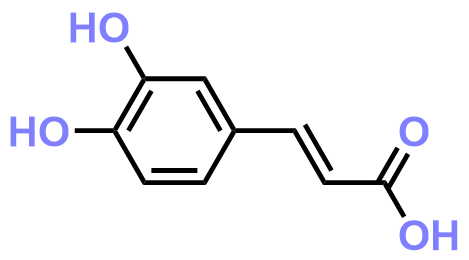Caffeic acid Analysis Service
Caffeic acid is a natural phenolic acid compound that belongs to the hydroxycinnamic acid family, widely found in various plants, particularly in fruits, vegetables, tea, coffee, and wine. It is especially abundant in coffee and certain medicinal plants. Its chemical structure consists of a caffeic acid backbone along with hydroxyl and methoxy functional groups. Caffeic acid typically exists in plant tissues either in its free acid form or as part of esterified compounds, playing a role in plant defense mechanisms and UV protection.
Due to its diverse biological activities, caffeic acid has found extensive applications in the pharmaceutical, food, and cosmetics industries. In the pharmaceutical field, caffeic acid is being researched for the development of antioxidant, anti-inflammatory, and anticancer drugs. Its strong antioxidant properties help to scavenge free radicals, slowing down cell damage and aging; its anti-inflammatory characteristics aid in reducing inflammatory responses; and its anticancer effects are demonstrated by the inhibition of cancer cell proliferation and migration. In the food industry, caffeic acid is used as a natural preservative and antioxidant to extend shelf life and enhance nutritional value. In the cosmetics field, caffeic acid is used to prevent skin aging and protect the skin from UV damage, offering significant benefits for beauty and skincare. Common methods for analyzing caffeic acid include high-performance liquid chromatography (HPLC), gas chromatography-mass spectrometry (GC-MS), and liquid chromatography-mass spectrometry (LC-MS). These techniques can accurately measure the content of caffeic acid in various samples, providing a scientific basis for its application across different fields.

Figure 1. The Structure of Caffeic Acid
Utilizing our state-of-the-art high-performance liquid chromatography-mass spectrometry (HPLC-MS) platform and a skilled metabolomics team, MtoZ Biolabs offers a comprehensive Caffeic Acid Analysis Service. Our methods ensure high sensitivity and accuracy for a thorough analysis of caffeic acid.
Analysis Workflow
Service Advantages
1. Expert Team: Our team scientists have deep understanding and extensive experience in MS and metabolomics.
2. Advanced Techniques: We employ state-of-the-art HPLC-MS platforms that ensure high sensitivity and specificity of detection.
3. Customizable Service: Our service is flexible to accommodate specific research needs and goals.
4. Fast Turnaround Time: We strive to deliver results in a timely manner without compromising on the quality.
5. Data Confidentiality: We strictly adhere to data security and confidentiality protocols.
Sample Submission Requirements
1. Sample Types
We accept serum, plasma, urine, tissue homogenates, and other biological samples.
2. Sample Volume
A minimum of 200 μL of liquid sample or 200 mg of solid sample is required.
3. Sample Preservation
Samples should be stored at -80°C for stability.
Note: Please provide detailed information about sample collection and handling.
Deliverables
1. Experimental Procedures
2. Relevant Liquid Chromatography and Mass Spectrometry Parameters
3. Detailed Information on Caffeic Acid
4. Raw Data
5. Custom Analysis Report
Our caffeic acid analysis service is designed to support your research and product development by delivering accurate and reliable results.
How to order?







